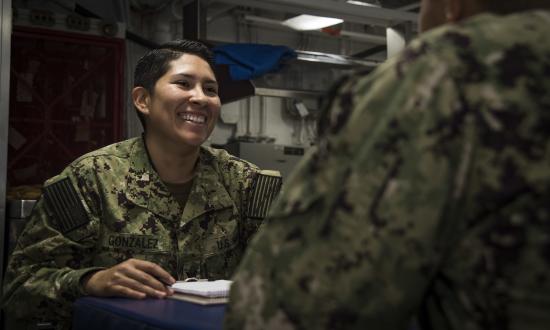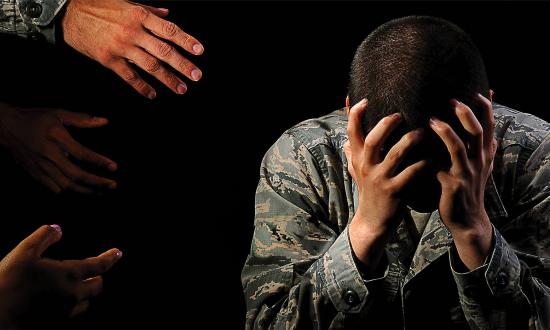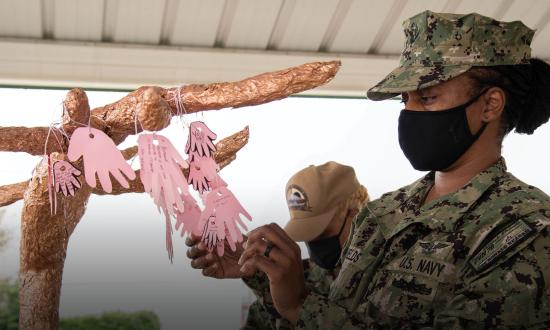When is the last time you took a fix?
Depending where you are in proximity to land, shoal water, and/or navigation dangers, ship drivers need to periodically take a positional fix to determine the ship’s location in relation to hazards plotted on the chart. In other words, you may not be where you think you are. If there is a mismatch or discrepancy, and you are not where you thought you were, you will need to change course so you do not put your ship in harm’s way. For 22 years, this process has kept my ships off the rocks and, as I have come to learn, this critical skill is just as valuable in my personal life.
In fall 2016, I was the incoming executive officer of the guided-missile destroyer USS Mason (DDG-87). A week before I was to meet the ship on deployment near the Horn of Africa, my father passed away unexpectedly of a heart attack. The shock of his death was compounded by my concern for the grieving family members I was leaving behind and the crewmembers to whom I would soon be introduced. There was no time to grieve. When I stepped off the plane in Djibouti, the oppressive heat foreshadowed my first day onboard the Mason. The day I arrived, Houthi rebels from Yemen attacked the Mason and the other ships in her company with antiship cruise missiles as we transited the Bab-el-Mandeb Strait north into the Red Sea. Subsequently, that October, the Mason successfully defeated missile attacks on three different days. The crew performed brilliantly. This was the first time a U.S. Navy ship has been attacked in such a way in decades and, as I learned, this unique experience is not something one can just “shake off.” A host of emotions lingered despite the compartmentalization I relied on to do my job.
About a year and a half later, I took command of my own destroyer, the USS Gonzalez (DDG-66). After a grueling workup schedule to get ready for deployment, we again deployed to the same region where I had previously been in combat. Throughout the course of a seven-month deployment, we operated in the Arabian Gulf and armed Iranian Islamic Revolutionary Guard Corps Navy (IRGCN) vessels harassed us daily. Our days saw guns on both sides of the ship manned with other ships and small boats often passing on near-collision courses in the middle of the night. Tensions were palpable, risk of miscalculation was high, and the national strategic implications were great. Again, there were personal tolls that I ignored, trying to neatly compartmentalize stress and fatigue into different causative boxes.
After completing deployment and a successful command tour, I had the good fortune and opportunity to work as the executive assistant for a two-star admiral. It is a career-enhancing job with the opportunity to work with and learn from one of the best Navy leaders. I loved the job, but it was during this transition—from commanding officer of a forward-deployed ship to a staff position with different demands and stresses—that I began to feel a sense of loss and uncertainty about everything. I had trouble sleeping, I was moody, and I was not myself. Moreover, free from the convenient and plentiful distractions of command, I was decompartmentalizing and overwhelmed with my thoughts. I was steering a course toward shoal water. In fact, I had been for a while and did not recognize it. In a relatively short period of time, I had experienced several major life events—the loss of a parent, a combat deployment, preparation for command, and command in a combat area. I had not “taken a fix” to determine my true position. I was lost and knew I needed a hand to get back on course.
Getting Healthy
Through a friend of a friend, I discretely set up a meeting with a Navy psychologist. I was secretive about it because I feared the stigma that can be associated with mental health care. I feared it may impact my career. I feared I would be seen as “weak.”
At the first meeting, I unburdened my thoughts and started to appreciate how my emotional navigational strategy over the past four years left me in high-survival mode in the wake of unprocessed experiences. Worry for the future and neglect of my past was influenced my self-awareness. I needed a fix to find my true bearing.
One aspect of this meeting that stood out was gaining a broader appreciation for how paramount mental hygiene is to ourselves, and to our brothers- and sisters-in-arms. While I learned that routine periodic check-ins by operational psychologists with sailors and leaders is not a new concept, we need to make sure all have ready access to them.
I left my first session with the doctor clear-headed, armed with a new strategy, a renewed sense of purpose, and most important, the promise that if I felt off course again I would return. And I have.
Good navigators take a fix at frequent intervals, depending on their proximity to shoal water. Good leaders evaluate how they are doing both professionally and personally from time to time—the frequency may vary, but periodically they self-assess, look for feedback from those they trust, and adjust course by adapting their practices accordingly. Sometimes, because of our personal challenges and professional schedules, we neglect the time for that fix.
My story is about why receiving a regular, periodic fix is necessary. The health and performance of officers and sailors in the fleet demand they pay attention to their psychological wellbeing. As leaders, they need to advocate for culturally competent programs and related resources that unravel the stigma of being “broken” when mental health “issues” arise. Sometimes the best intervention is the one provided when not sought, so blind spots, pride, and hang-ups cannot get the best of us.
This experience has helped me grow as a leader and better prepare me for major command. I know it has also made me a better person, husband, father, and officer.
Remember to take a fix from time to time. Make sure you are still in safe waters.






